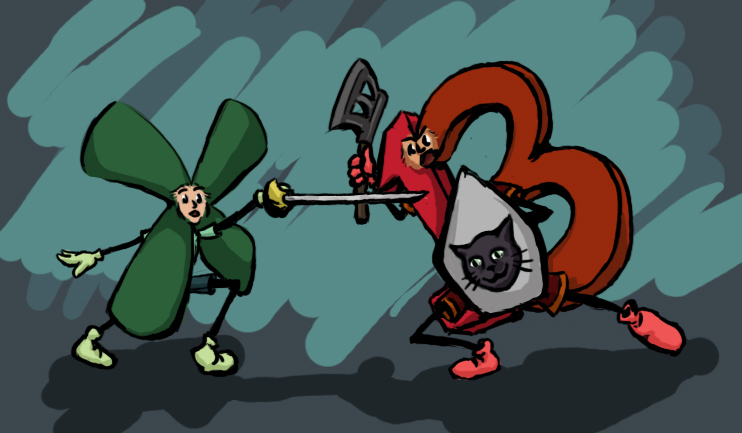I realized that, purely by coincidence, I happened to post a picture of a four-leaf clover on a Friday the 13th.
So what the hey, let’s talk about superstition!
I’m simultaneously superstitious and skeptical, which doesn’t really work. It’s more like I keep catching myself changing my behavior because of a superstition (like going out of a way to collect the 14th of an item rather than sticking at 13), reminding myself that it’s a superstition and I don’t need to worry about it, and then, as a further level, reminding myself that I may have needed that 14th item anyway, and superstitions aren’t all bad.
Most superstitions tend to come from one logical fallacy or another. Perhaps the most common to cause this is a form of observation bias. People notice a pattern between two connected events (good or bad) that actually has nothing to do with the events, such as “It rained when I went for a walk on the beach, twice” or the classic “I won both ball games while wearing this pair of pants”. Then, that person, largely subconsciously, starts assuming that the pattern influenced the outcome of the event. “I can’t take a walk on that beach, I’ll get wet” or “These are my lucky pants! If I wear them, I’ll win!.” Then you toss in a bit of the pattern continuing, such as winning the next ball game, and the superstition gets set. After that, even if the pattern and the event aren’t connected, the brain will pick and choose which memories take precedence, and will pick those that matched (this is where the observation bias comes in). We humans tend to like patterns and things that confirm our beliefs, so we always remember the times that confirmed the superstition better than those that didn’t. Thus, even if, say, you lost as many ball games as you won wearing your lucky pants, you still will be convinced that you are gaining luck from said pants purely because you remember the wins better.
Mind you, this is actually a rather helpful thing to have, in most cases. Superstitions come from the same learning process that causes us to improve our skills. Say it was a new way of throwing the ball rather than pants, one that actually does provide better results than the old way. Again, the brain notices a pattern, “throwing this ball this way makes me win more” and sets the “superstition” in place. In this case, though, it is not considered a superstition as it is actually something that does cause the outcome to happen. Causation rather than correlation, if you prefer.
The superstitions are merely a side effect of how our brains learn about the world. The tough part comes in sorting out what beliefs you have are false superstitions and which are true superstitions, since, after all, they’re stored the same way in the brain. At least the true ones tend to get additional confirmation that helps shunt them from superstition to a more permanent fact.
Oddly enough, for me, Friday the 13th seems to be more lucky than unlucky. Mind you, this is merely because the probability of a day I consider “lucky” is much higher than a day I consider “unlucky”, and, because of the cultural superstition about Friday the 13th being unlucky, I actually pay just a little bit of attention to how lucky the day was. It’s pure baloney that the day is a lucky one for me. Still, it is somewhat amusing thinking about it, so it sticks in my head over the years.
And this Friday was a good day for me, far more productive than most of my days were. I mean, I finally fixed a long-standing problem with my mother’s computer, and I took a long walk where I took (exactly) 100 photos, many of which turned out well.
Hmm, maybe there is something to it…
Just kidding.

